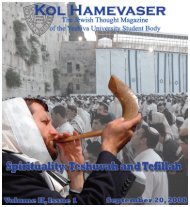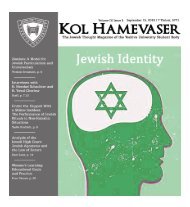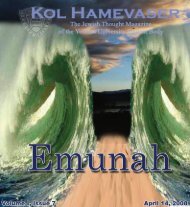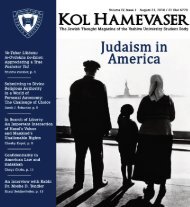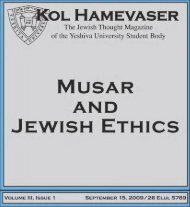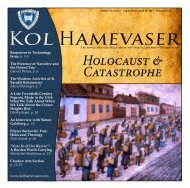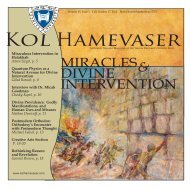You also want an ePaper? Increase the reach of your titles
YUMPU automatically turns print PDFs into web optimized ePapers that Google loves.
Volume III, Issue 7<br />
<strong>Halakhah</strong> <strong>and</strong> <strong>Minhag</strong><br />
General Jewish Thought<br />
An Interview with Chief Rabbi Lord Jonathan Sacks<br />
BY: Shlomo Zuckier<br />
As Chief Rabbi of the United Hebrew<br />
Congregations of the Commonwealth,<br />
how is your role different from that of<br />
an ordinary rabbi?<br />
It means that I have to look after the welfare<br />
of all the congregations under my aegis in<br />
Britain, <strong>and</strong> it means that I have to be there for<br />
other rabbis. And, of course, to some extent<br />
throughout the Commonwealth in general<br />
there are she’eilos that come to our beis din.<br />
As such, I try to look after the pastoral concerns<br />
of our rabbis as they would look after<br />
those of their congregations. So it is a more<br />
global, policy-shaping role, <strong>and</strong> it takes me a<br />
little way away from direct encounter with individual<br />
congregants, which is the kind of<br />
work that ordinary rabbis do <strong>and</strong> is at least as<br />
important.<br />
Could you tell us more about how you became<br />
the person you are today? Who are some<br />
of your role models?<br />
I had the enormous privilege, as a 20year-old<br />
student in 1968, of having two lifechanging<br />
meetings, one with the Lubavitcher<br />
Rebbe, of blessed memory, <strong>and</strong> one with Rabbi<br />
Joseph B. Soloveitchik, of blessed memory.<br />
The Lubavitcher Rebbe challenged me to be a<br />
leader, <strong>and</strong> Rav Soloveitchik challenged me to<br />
be a thinker. Those two moments, long, long<br />
ago, shaped my life.<br />
What do you think are the largest issues<br />
facing Diaspora Jewry today? Do you envision<br />
any possible solutions?<br />
I think it is fairly clear that assimilation<br />
<strong>and</strong> anti-Semitism are the key issues. We have<br />
now reached the point at which people underst<strong>and</strong><br />
that education in Jewish day schools is<br />
the only effective way of combating assimilation,<br />
<strong>and</strong> those sections of the community that<br />
have adopted that belief have, by <strong>and</strong> large, cut<br />
intermarriage by a large margin.<br />
Anti-Semitism remains a big problem in<br />
Europe, though, <strong>and</strong> we must have allies in<br />
combating it. Jews cannot fight anti-Semitism<br />
alone; the victim cannot cure the crime, the<br />
hated cannot cure the hate. So we have worked<br />
on this problem in Britain, <strong>and</strong> succeeded at<br />
being the first country where the fight against<br />
anti-Semitism is led by non-Jews.<br />
As Jews living in a secular world, how<br />
should we balance or harmonize our religious<br />
<strong>and</strong> secular values?<br />
I prefer integration to compartmentalization.<br />
I see a huge number of Jewish doctors<br />
fighting disease, economists fighting poverty,<br />
lawyers fighting injustice. I wrote a book<br />
called To Heal a Fractured World because a<br />
Jewish lawyer once asked me, “I know perfectly<br />
well how to serve God at home or in the<br />
beit midrash, but how do I serve God for the<br />
12 or 16 hours a day when I’m being a<br />
lawyer?” So I wrote that book for him, <strong>and</strong> I<br />
hope it answered at least some parts, if not all,<br />
of his question. But I do believe that we need<br />
to bring our Jewishness into everything we do,<br />
whatever we do. I once met a Jewish bus conductor<br />
who took it upon himself to cheer up all<br />
his passengers. This was a beautiful ruchani<br />
(spiritual) act, <strong>and</strong> it was clear that he had done<br />
it throughout his life – <strong>and</strong> this man was already<br />
in his 80s! He was larger than life. He<br />
had found a way to serve Hashem as a bus conductor.<br />
And every role any of us has can be<br />
turned into a mode of serving Hashem.<br />
While living in the Diaspora, how can we<br />
best support our brethren in Israel?<br />
Through constant hasbarah (public diplomacy).<br />
Many people do not underst<strong>and</strong> the existential<br />
threat that Israelis live with every<br />
single day that began with the moment of Israel’s<br />
birth <strong>and</strong> that has continued to intensify<br />
ever since. We have to explain that Israel is the<br />
last great bastion of hope in the Middle East<br />
for democracy, with both an independent judiciary<br />
<strong>and</strong> a free press – in essence, a liberal<br />
democracy. If we lose Israel <strong>and</strong> that last best<br />
hope, God forbid, the Middle East will be impoverished,<br />
the world will be impoverished;<br />
freedom will have suffered one of its greatest<br />
defeats ever. That is why I ask not only pro-<br />
Israelis to support Israel, but pro-Palestinians<br />
<strong>and</strong> those who are pro-Arab to support Israel<br />
as well, because Israel really has shown how a<br />
small country can achieve greatness in an area<br />
where a full-fledged democracy <strong>and</strong> open society<br />
had never been achieved before. I have<br />
defined Judaism (in my latest book, Future<br />
Tense) as “the voice of hope in the conversation<br />
of humankind,” <strong>and</strong> Israel is the home of<br />
that hope. It has significance far beyond the<br />
Jewish people as a testimony of the power of<br />
faith in life after the Holocaust, <strong>and</strong> we must<br />
do all we can to defend it against its enemies,<br />
who are, in truth, enemies of freedom itself.<br />
How should fully observant Jews relate to<br />
their nominally Orthodox but at times heterodox<br />
(<strong>and</strong>/or heteroprax) brethren?<br />
With total friendship. St<strong>and</strong> firm by your<br />
principles <strong>and</strong> do not compromise one syllable<br />
of Halachah, but go <strong>and</strong> make friends with all<br />
the people who do not believe as you believe.<br />
Friendship can achieve much that intellectual<br />
argument cannot.<br />
Do you think that we should be involved<br />
as individuals or as communities in interfaith<br />
dialogue?<br />
I have written about this in a book of mine<br />
called The Home We Build Together, <strong>and</strong> there<br />
I contrast, using a famous idea of R.<br />
Soloveitchik’s, zts”l, the ideas of being “faceto-face”<br />
<strong>and</strong> “side-by-side.” I call dialogue an<br />
interaction that is “face-to-face” but characterize<br />
it as being not at the very heart of the problem.<br />
It is, by its nature, an elite undertaking,<br />
conducted by people at the mountaintop of<br />
their respective faiths. It does not always filter<br />
down to the grassroots, where the problems lie.<br />
Of course, I do not criticize dialogue – it has,<br />
for example, transformed the relationship between<br />
Jews <strong>and</strong> the Catholic Church. But it is<br />
not, in <strong>and</strong> of itself, sufficient. Liberal voices<br />
– the voices that tend to be the most prominent<br />
in dialogue – do not always succeed, especially<br />
in an age like ours where the extremists tend<br />
to prevail in conflict zones.<br />
So I prefer the “side-by-side” approach of<br />
www.kolhamevaser.com<br />
community relations, what we call in halachic<br />
terms “darchei shalom” (ways of peace). In<br />
that vein, I played a part in encouraging Jews<br />
<strong>and</strong> Muslims in Britain to fight anti-Semitism<br />
<strong>and</strong> Islamophobia together. Both problems affect<br />
both of us, so we should fight them together,<br />
<strong>and</strong> that is what I call “side-by-side.”<br />
It does not involve sharing our theologies; it<br />
simply involves recognizing that we both have<br />
people out there who do not like us very much.<br />
And that distinction between open religious dialogue<br />
<strong>and</strong> communal cooperation is made by<br />
Rav Soloveitchik both in his essay “Confrontation”<br />
<strong>and</strong> in The Lonely Man of Faith.<br />
You recently received the inaugural Norman<br />
Lamm Prize recognizing your scholarship<br />
<strong>and</strong> commitment to Rabbi Dr. Lamm’s ideals.<br />
Could you tell us what you think R. Lamm’s<br />
greatest achievements were in his over 50<br />
years of leadership in the American Jewish<br />
community?<br />
First, he saved Yeshiva from closure, from<br />
one of its most severe financial crises. Second,<br />
he built up an immense educational institution,<br />
<strong>and</strong> those elements of it that I have seen in my<br />
week’s stay here have been truly impressive.<br />
There is no other institution like Yeshiva University<br />
in the Jewish world. It is an astonishing<br />
achievement, <strong>and</strong> it owes an enormous amount<br />
to Rabbi Lamm. And third, he has shown<br />
tremendous courage <strong>and</strong> tenacity in carrying<br />
Torah u-Madda forward without any deviation<br />
whatsoever. At times when it was quite difficult<br />
to do so, he had the koach (power) to build<br />
<strong>and</strong> the gevurah (strength) to stay true to his<br />
principles.<br />
What would you say should be the intellectual<br />
goals of a committed Orthodox college<br />
student?<br />
“We need to bring our<br />
Jewishness into everything<br />
we do, whatever we do.”<br />
Well, one should learn at least as much<br />
about Yahadus as about one’s specialization,<br />
<strong>and</strong> there should be integration between the<br />
two. I call them, metaphorically, the right <strong>and</strong><br />
left hemispheres of the brain. So, to put it more<br />
generally, science is a left-brain activity, religion<br />
a right-brained one. Science takes things<br />
apart to see how they work. Religion puts<br />
27



